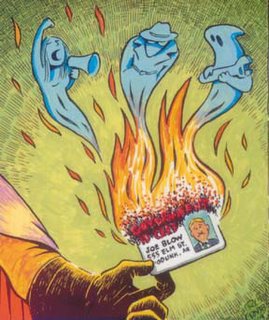B.W.'s Book Report: The Freedom Outlaw's Handbook, in the context of Montag's revelation
 I've been having fun and taking liberty for granted. I have an optimistic streak that is based in part on a conviction that I'm preaching to the converted; that even those who encounter me outside of the freedom blogs, in the pages of the publication I'm associated with under a different name, agree with me in their heart of hearts that good old American Don't-Tread-On-Me freedom is a sacred thing worth preserving. As long as the First Amendment exists, I'd be cool.
I've been having fun and taking liberty for granted. I have an optimistic streak that is based in part on a conviction that I'm preaching to the converted; that even those who encounter me outside of the freedom blogs, in the pages of the publication I'm associated with under a different name, agree with me in their heart of hearts that good old American Don't-Tread-On-Me freedom is a sacred thing worth preserving. As long as the First Amendment exists, I'd be cool.Well, two things have shaken my sense of having fun and my optimisim. One is reading The Freedom Outlaw's Handbook: 179 Things To Do 'Til The Revolution by Claire Wolfe. I have a fairly modest readership that comes to visit from places like Claire's and Sunni Maravillosa's and Wally Conger's hangouts, so I'm probably the last person left in the gang to read this book. But as chock full of good humor as it is, it's also a sobering read for its laundry list of the ways in which our culture is flushing freedom down the drain.
And the other blow to my cheerful outlook is this, a Chicago Tribune poll that finds 80 percent of the Windy City's denizens perfectly OK with the idea of a citywide surveillance system of cameras watching them with Orwellian efficiency.
The city's surveillance network includes more than 2,000 cameras in such sites as transit stations, streets and public housing complexes. Included are about 100 police devices, featuring flashing blue lights, on utility poles in high-crime areas. ...
Community leaders say, "`Do something about the problem,'" the alderman said. "`The drugs are killing us. The gangs are a major problem. We want the cameras.'"
Bradbury's Fahrenheit 451 turns out to be the most chillingly accurate of all the great dystopian novels. Montag the fireman learns to his astonishment that book-burning began as the result of popular demand. "Ignorance is strength!" they yelled - well, OK, actually that phrase was in Orwell's 1984, but that's the gist of Bradbury's point: People were tired of the way books made them feel uncomfortable, so they demanded that government burn the offending bits of paper. It wasn't an oppressive government forcing this on them; it was the citizenry deciding it preferred oppression to discomfort and inconvenience.
And so it is in our world today. The cameras really began as private enterprise's way to try to prevent shoplifting and drive-off gas-ups. We grew used to the surveillance cameras in more and more places. And now an overwhelming majority supports, even demands, government cameras everywhere. This is not a time for optimism after all.
I choose to remain cheerful anyway; at times when the choice is to laugh or to cry, laughing is always more pleasant. But where the other day I was careless about tossing bits of my privacy away here and there, sharing with strangers the deepest secrets of Brian Richardson, now I'm feeling more guarded even with those I'm sure I could trust. It's not paranoia, though it might sound like it. It's more a recognition of how precious a thing privacy is, and how hard it might be to reclaim once lost.
So, fellow freedom lovers, now I have a better understanding of what you've been talking and writing about. But Simon Jester is still my favorite revolutionary, so don't expect me to get too gloomy and doomy anytime soon. Just more careful.
Labels: book report



2 Comments:
Sounds to me like you had a useful infusion of wisdom; and I'm glad to see it hasn't tempered your positive side. I've long been of the opinion that if one allows the thought police to make existence a dreary, dull exercise, they've won, whether they've directly interfered with one's life or not.
I guess my question would be, "What exactly are you optimistic about?"
Post a Comment
Subscribe to Post Comments [Atom]
<< Home